If you’re searching for the best alternative to Alchemy Pipelines, look no further. In this guide, we’ll introduce Moralis’ Streams API – the ultimate tool for setting up Web3 data pipelines. With an intuitive user interface, you can use this API to create streams for any custom event, wallet, or smart contract at the click of a few buttons. But what makes the Streams API a superior choice compared to Alchemy Pipelines? For a quick overview, check out the comparison table below summarizing the key differences between them:
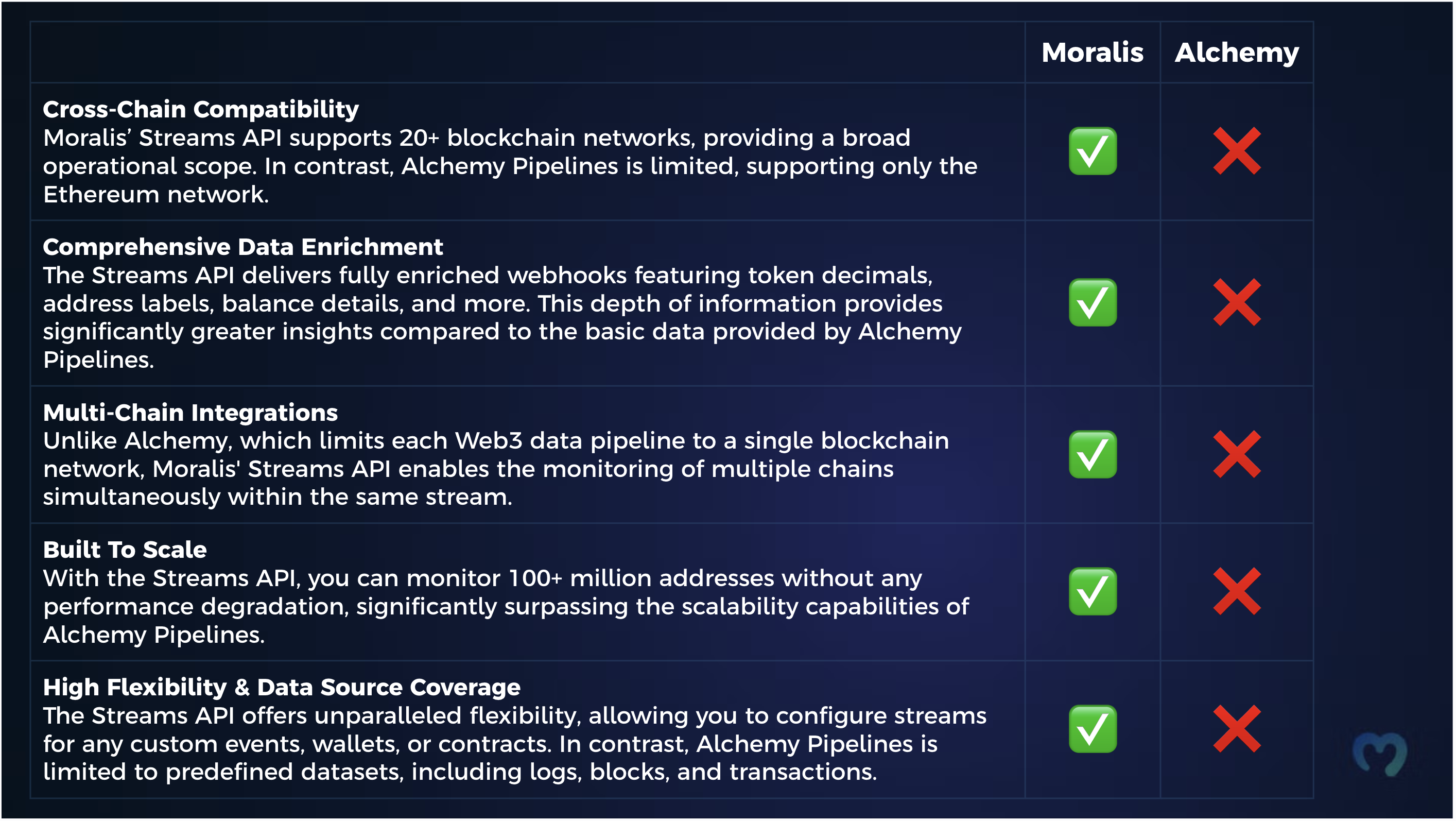
If you’d like to learn more about the Streams API, check out the official Streams API documentation page or join us in this article. Not only will we dive deeper into this premier interface but we will also provide a comprehensive tutorial on how to set up your own Web3 data pipelines without breaking a sweat.
Also, consider signing up with Moralis if you want to build your own Web3 data pipelines. Registration is free, and you’ll instantly gain access to the Streams API along with a suite of other top-tier development tools. Join us and start leveraging these powerful resources today!
Overview
Alchemy Pipelines is a service that offers a user-friendly platform for setting up Web3 data pipelines. However, while it’s a relatively solid solution, it has several limitations you need to consider. First of all, Alchemy Pipeliens remains in beta testing, meaning it’s far from being finished. Additionally, Alchemy has limited cross-chain support and features narrow data source coverage, focusing only on basic events like logs and transactions. Fortunately, several prominent Alchemy Pipelines alternatives are available, and at the top of the list, you’ll find Moralis’ Streams API!

But what is the Streams API? And how does it work? If you’d like to explore the easiest way to set up Web3 data pipelines, then this read is for you. It doesn’t matter if you’re building a cryptocurrency wallet, decentralized exchange (DEX), or any other platform; we’ve got you covered. Let’s get started!
What is Alchemy Pipelines?
Alchemy Pipelines offers a solution for developers to set up Web3 data pipelines for streaming real-time blockchain events into decentralized applications (dapps) and databases. The service includes a straightforward point-and-click interface, simplifying the creation of data pipelines. However, it is important to note that Alchemy Pipelines is still in its beta testing phase, which indicates that it is not yet a fully developed product!

Alchemy Pipelines was designed to streamline the setup of Web3 data pipelines, eliminating the need to build key components from scratch. Without services like these, you generally need to set up a reliable backfill, create ingestion services, develop mechanisms for handling reorgs, etc. Implementing these components yourself demands significant development time and resources, which could be more effectively allocated toward developing premium features.
However, while Alchemy Pipelines tries to simplify the process of setting up streams, this solution still leaves a lot to be desired. To elaborate on this further, we’ll explore the limitations of Alchemy Pipelines in the following section!
Limitations of Alchemy Pipelines
Alchemy Pipelines is a solid service, yet it has its shortcomings. Let’s examine three notable limitations of this solution:
- No Cross-Chain Support: A notable limitation of Alchemy Pipelines is its lack of cross-chain support. Ethereum is currently the only available network, which significantly restricts the operational scope of Alchemy Pipelines.
- Limited Data Source Coverage: Alchemy Pipelines supports only a narrow range of data sources, such as logs, blocks, and transactions. Consequently, it fails to accommodate wallet addresses, balance changes, and other events that are critical for dapp development.
- Chain Restrictions: Alchemy Pipelines limits each pipeline to a single blockchain. As a result, it’s not possible to handle multiple networks within the same stream.
- Beta Testing: Alchemy Pipelines is currently undergoing beta testing, which means developers will likely encounter bugs that can degrade the end user’s experience.

The limitations of Alchemy Pipelines make it far from an ideal solution when it comes to building top-tier dapps. As such, let’s look at the top Alchemy Pipelines alternative to find a more suitable tool for Web3 developers!
Top Alchemy Pipelines Alternative
There are multiple prominent Alchemy Pipelines options; however, the industry’s leading alternative is Moralis’ Streams API. But what exactly is Moralis? And what makes the Streams API the best solution available for Web3 data pipelines?
Moralis is the premier Web3 data provider, equipped with cutting-edge nodes and APIs designed to streamline your developer experience. In our suite of top-tier development tools, you’ll find the Streams API – the industry’s leading interface for setting up Web3 data pipelines!
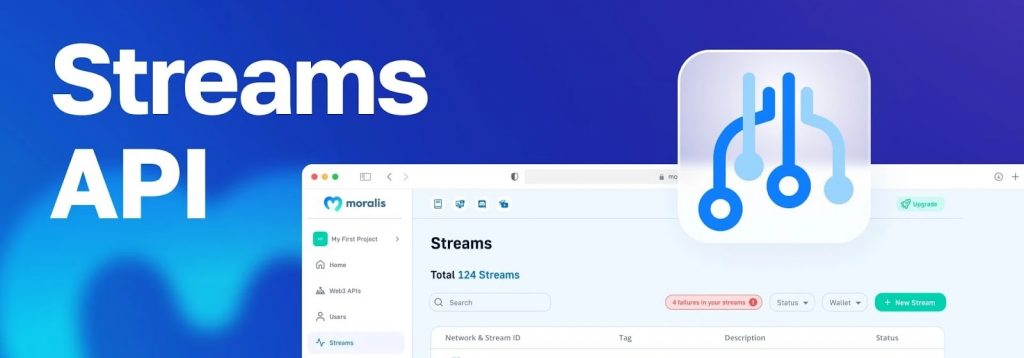
The Streams API is highly dynamic and comprehensive, supporting 44+ million contracts across all major chains, including Ethereum, BNB Smart Chain (BSC), Polygon, etc. What’s more, this leading interface covers all types of events, tokens, DeFi platforms, wallets, and much more, giving you everything you need in terms of real-time Web3 data.
With the Streams API, you can easily set up your own pipelines to receive instant, fully customizable updates sent to the backend of your project via webhooks as soon as something important happens on-chain.
As such, when leveraging the Streams API, you can effortlessly integrate real-time notifications into your dapps, keep databases populated with the most recent data, and enhance your project’s overall functionality with timely, actionable insights.
Now that we have an overview of the Streams API, let’s explore the benefits of this interface in the next section!
Benefits of the Streams API
So, what makes the Streams API stand out as the top alternative to Alchemy Pipelines? To answer this question, let’s explore five benefits of this industry-leading tool:
- Cross-Chain Support: Moralis’ Streams API supports 20+ chains, including Ethereum, Polygon, BSC, etc. What’s more, with our premier interface, you can monitor multiple chains with a single Web3 data pipeline.
- Comprehensive Data Source Coverage: The Streams API supports all types of data sources. As such, with this premier interface, you can monitor any event, wallet, or smart contract with ease.
- Full Customization: Offering unmatched flexibility, Moralis’ Streams API is the industry’s most adaptable tool for creating Web3 data pipelines. This API allows you to customize your streams to meet any specific use case, giving you full control.
- Enriched Data: The webhooks returned from the Streams API contain enriched data, including token decimals, address labels, balances of wallets included in transactions, and much more.
- Unparalleled Scalability: Designed for scale, the Streams API allows you to effortlessly manage anything from a single to 100+ million addresses with one stream, accommodating your project’s growth without compromising efficiency.
That covers the basics of the Streams API. In the next section, we’ll compare Moralis to Alchemy Pipelines!
Moralis Streams vs. Alchemy Pipelines
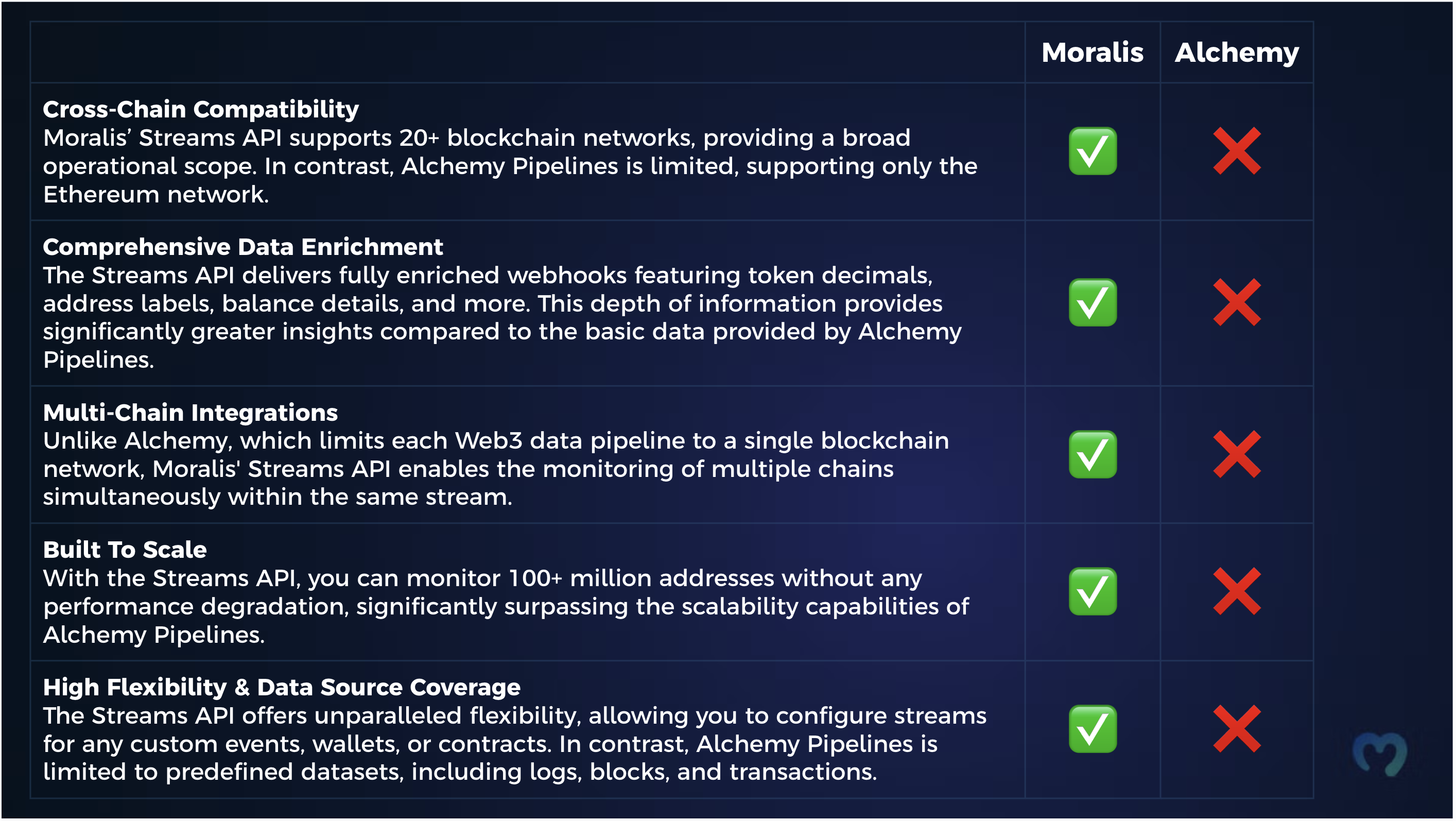
How to Create Web3 Data Pipelines with Moralis Streams
With the Streams API, you can seamlessly set up customized Web3 data pipelines at the click of a few buttons. To demo how this works, we’ll walk you through the process of creating a stream for monitoring USDC transactions in eight straightforward steps:
- Step 1 – Sign up for free with Moralis, navigate to the ”Streams” tab, and click on the ”+ Create Stream” button:
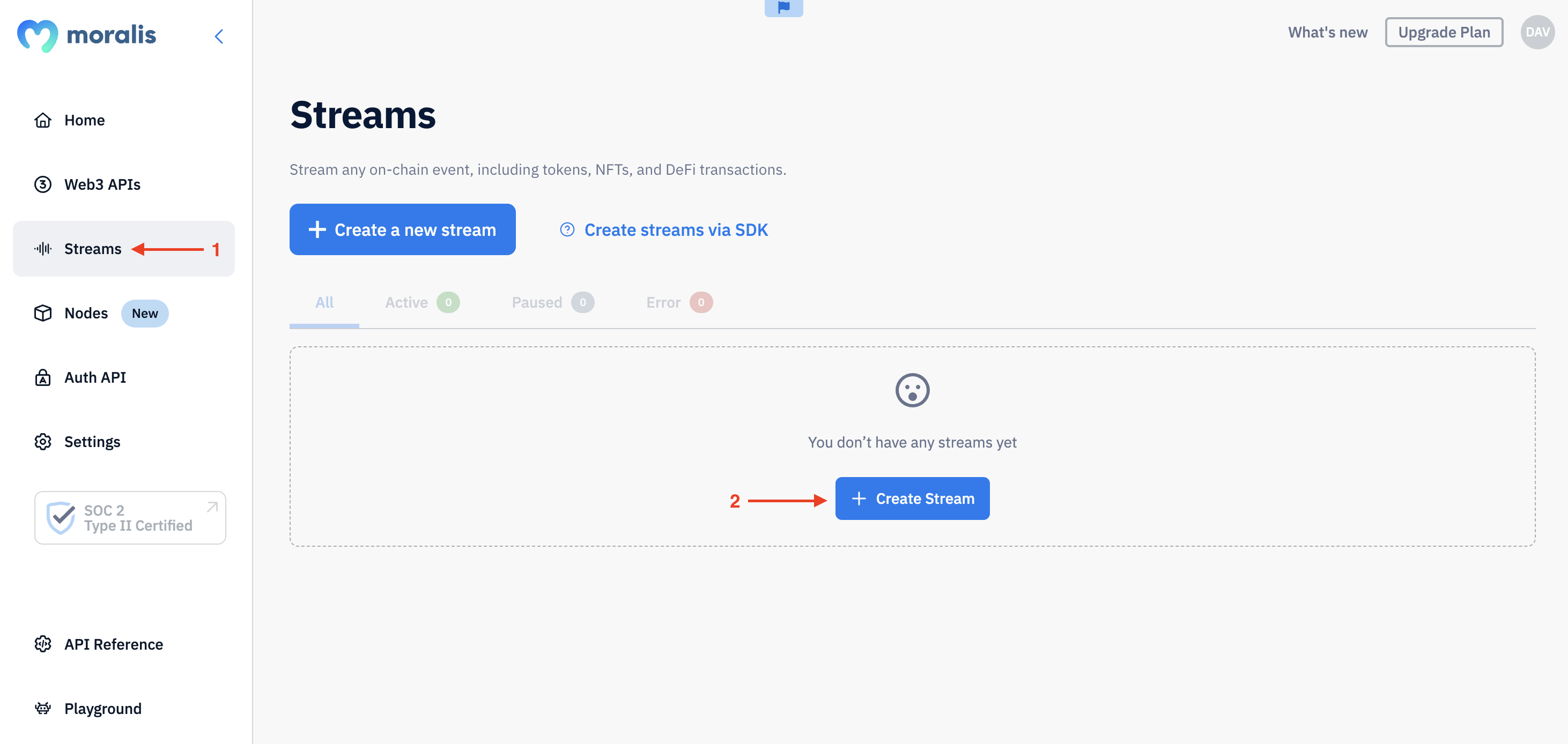
- Step 2 – Name your stream and select the types of events you wish to monitor. In our case, we’ll simply choose ”Contract Events”:
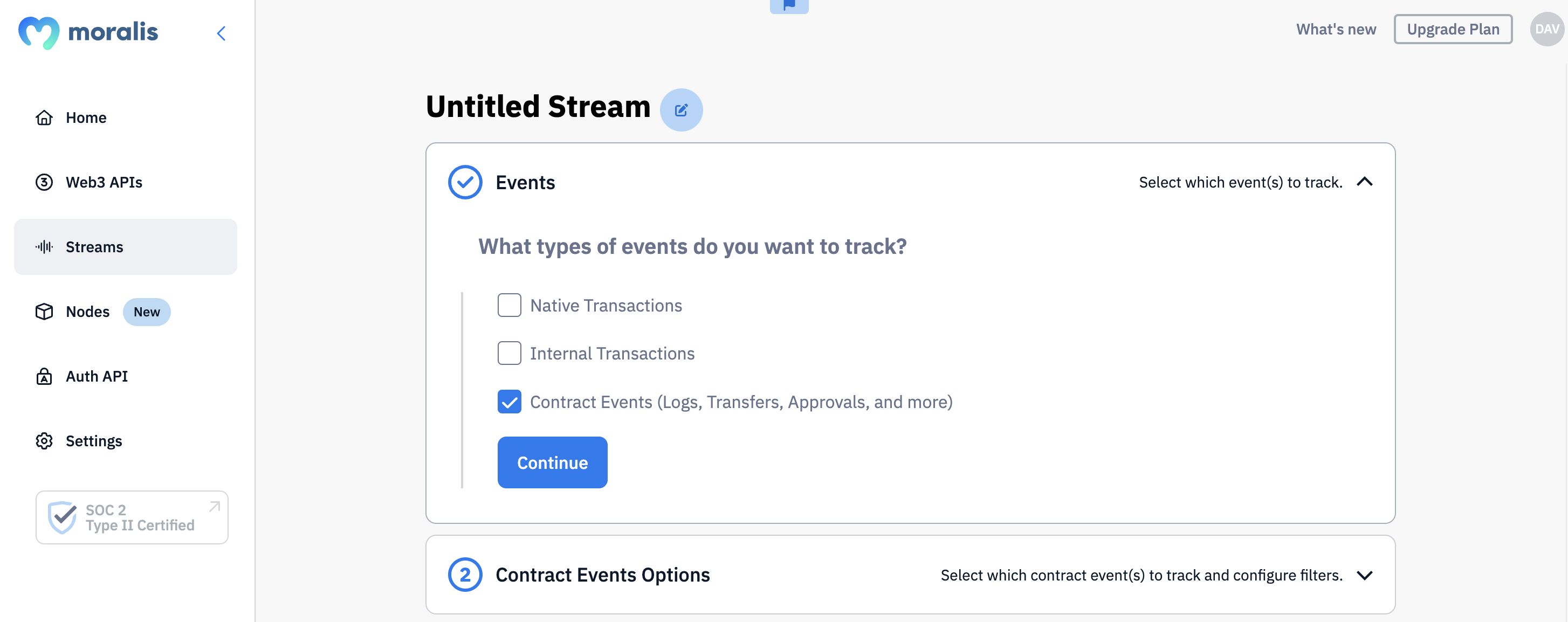
- Step 3 – Specify what contract events you want to track. For this tutorial, we’ll choose ”Common Events” followed by ”Token Transfers”:
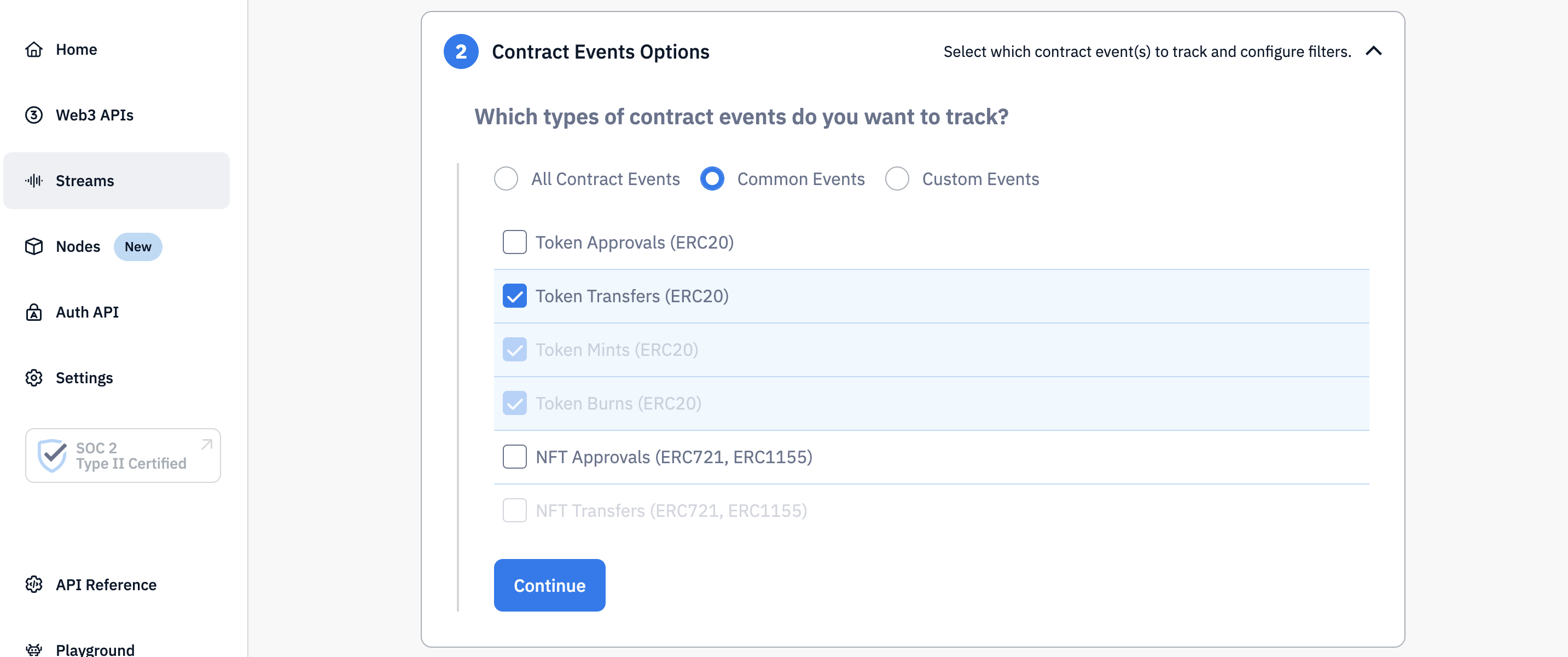
- Step 4 – Add a tag for your stream and select any additional information you want to include:
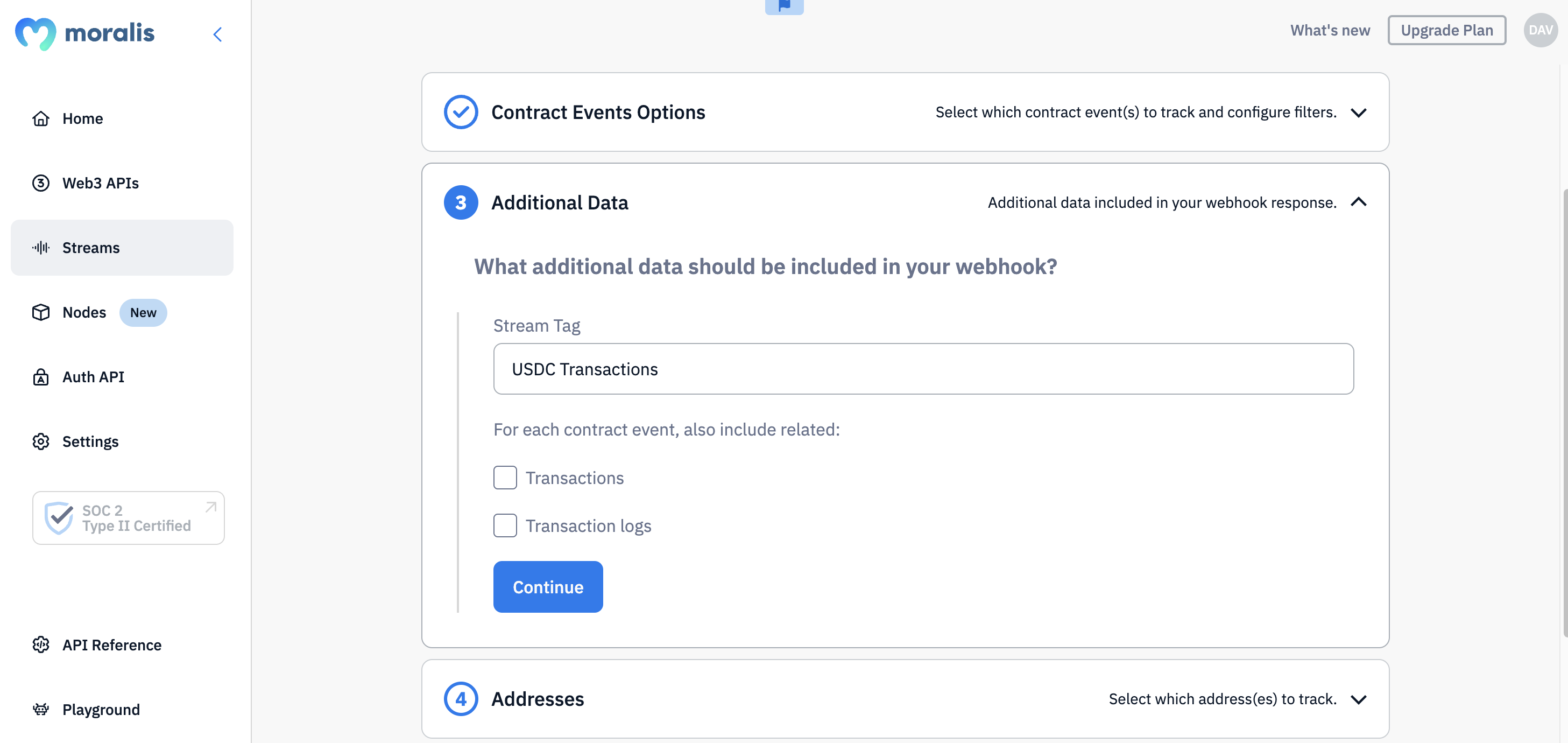
- Step 5 – Add the contract address you want to track. In our case, we’ll add the USDC contract address:
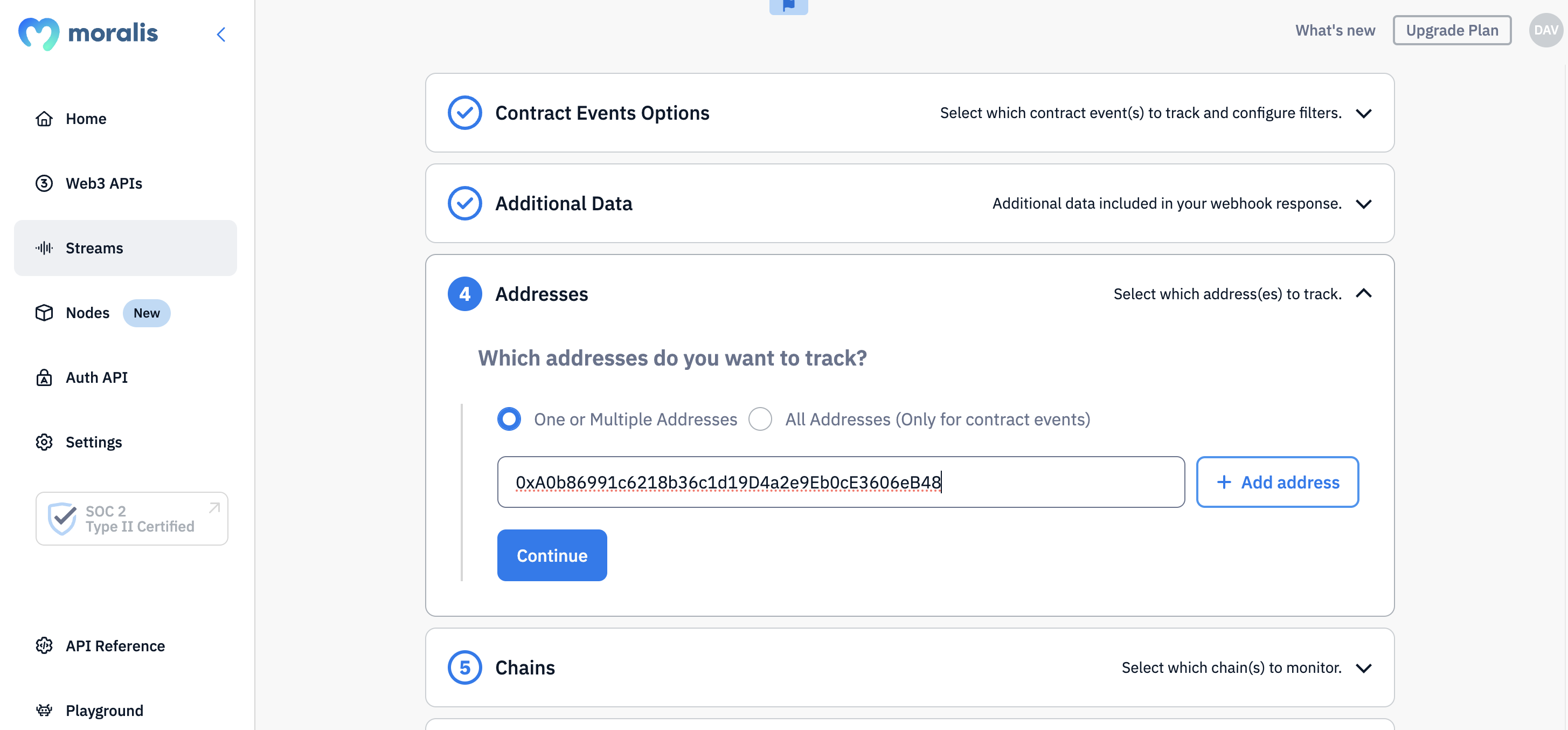
- Step 6 – Select the chain(s) you want to monitor. We’ll choose Ethereum, but you can pick any network(s) you desire:
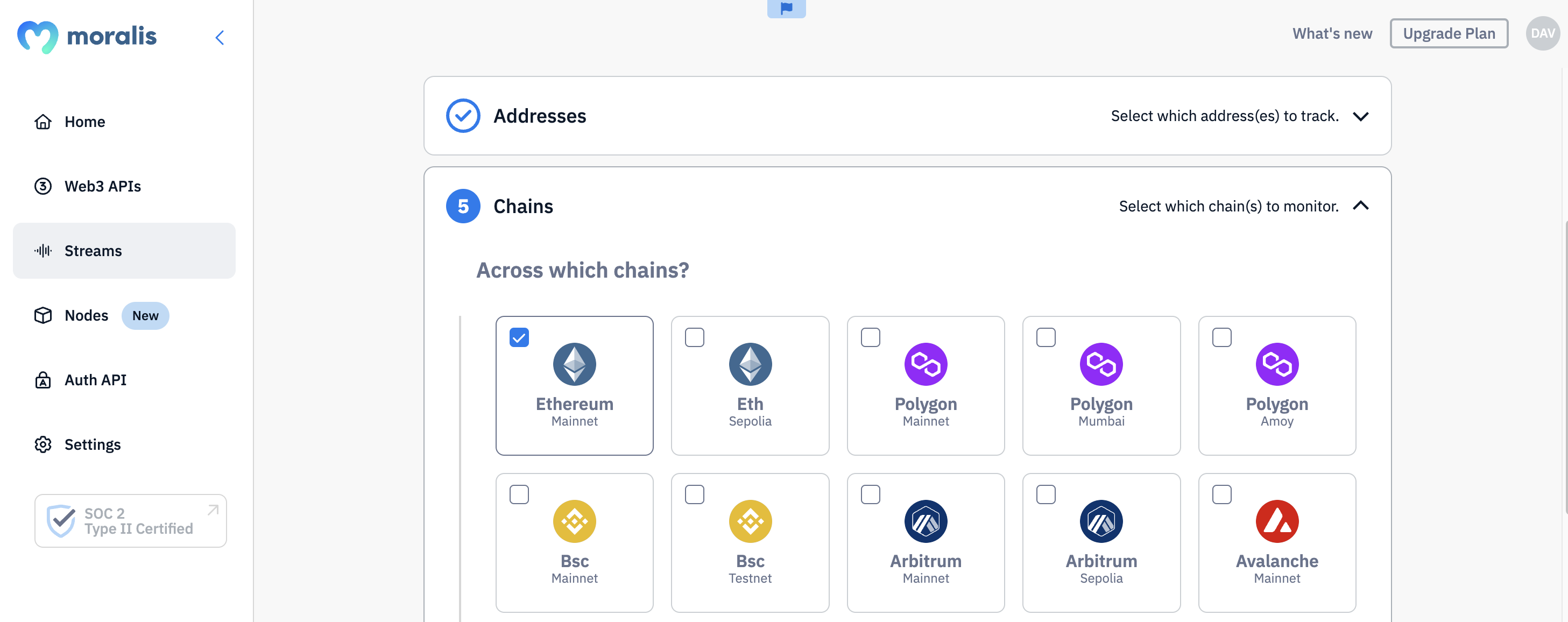
- Step 7 – Test your stream (optional):
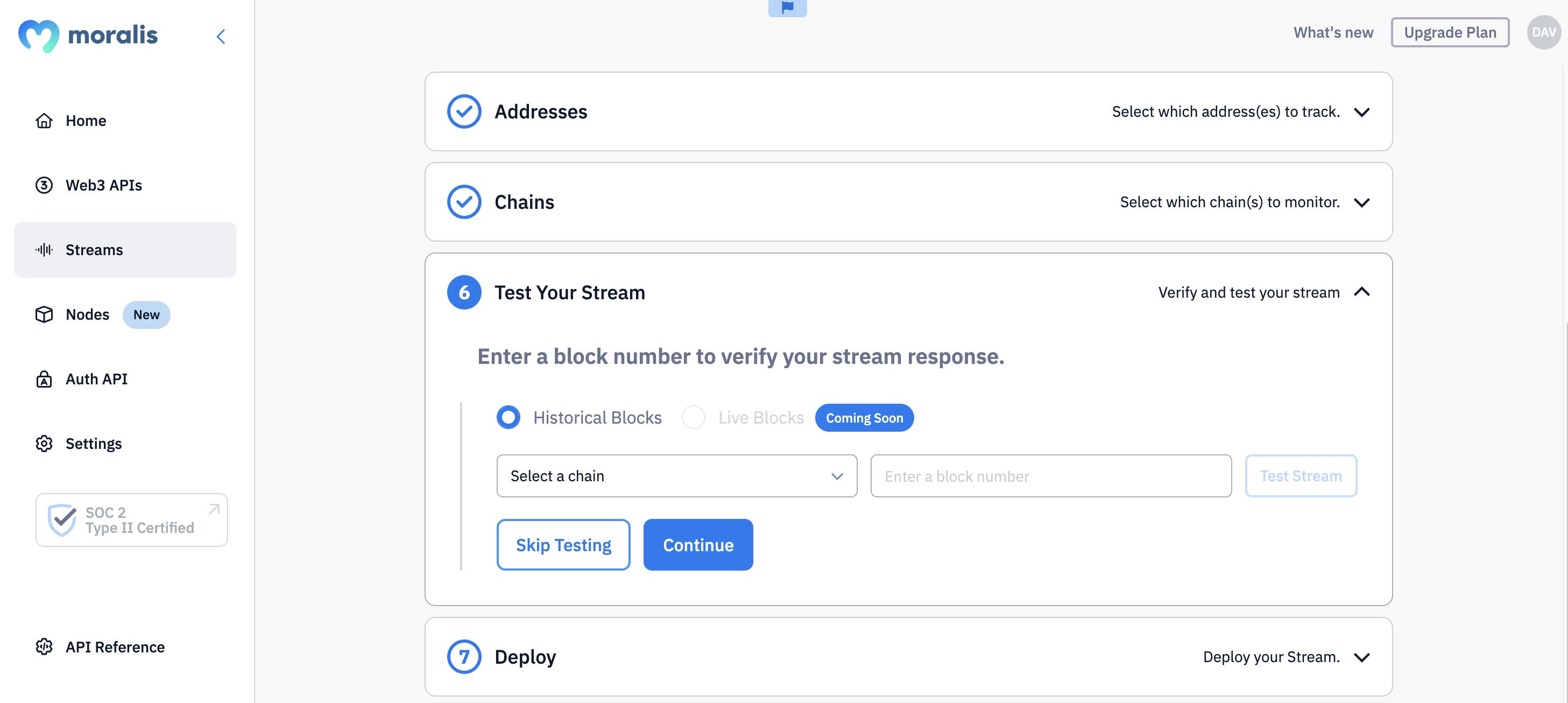
- Step 8 – Add a webhook URL, click on ”Continue”, receive a test webhook, and hit ”Save & Deploy”:
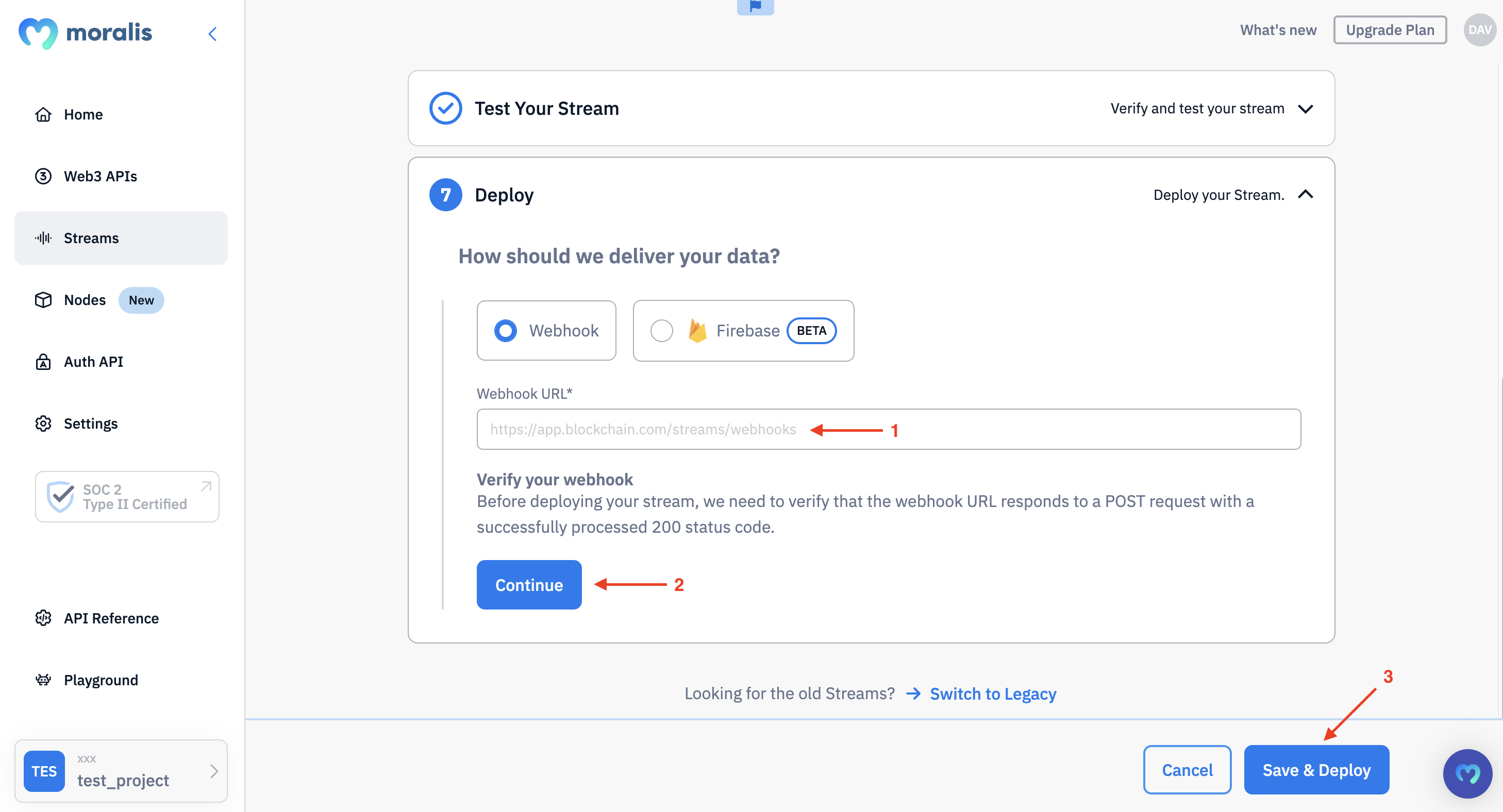
In return, you’ll now receive an update sent to your webhook URL as soon as there is a USDC transfer. Here’s an example of what it might look like:
//...
{
transactionHash: '0x1a3807aa7f7d1f4806245115d7b8a32ec105ce20f2b4a8ca31f9a305127c0201',
logIndex: '409',
contract: '0xa0b86991c6218b36c1d19d4a2e9eb0ce3606eb48',
triggered_by: [Array],
from: '0x47fbac3d17dcd481c3bb428adde4272b458cf724',
to: '0x8ad599c3a0ff1de082011efddc58f1908eb6e6d8',
value: '5187003613',
tokenName: 'USD Coin',
tokenSymbol: 'USDC',
tokenDecimals: '6',
valueWithDecimals: '5187.003613',
possibleSpam: false
},
/...
That’s it; setting up a Web3 data pipeline doesn’t have to be more challenging than that when using Moralis. From here, you can now follow the same steps and fundamental principles to set up your own customized data pipelines for any on-chain events!
For a more in-depth breakdown of the steps above and an example of how you can use the Streams API for real-world applications, check out the Moralis YouTube video down below:
Data Pipeline Use Cases – How Can You Use the Moralis Streams API?
The Streams API is highly dynamic and flexible, meaning that this feature has a bunch of interesting use cases. Let’s explore a few prominent examples down below:
- In-App Notifications: Set up and send real-time notifications to users based on their wallet holdings for events like token transfers, price changes, staking rewards, etc. This is the perfect tool for boosting user engagement in your dapps.
- Populate a Database: Monitor, index, and store events in your database in real-time, ensuring you maintain a comprehensive and accurate historical record of blockchain activities for a given contract, wallet, or address.
- Monitor Token Balances in Real-Time: Seamlessly track, update, and display the current balances of users’ wallets within your projects. The Streams API provides instant access to up-to-date information on asset holdings and their values, ensuring accurate and timely wallet insights.
The use cases outlined above are merely a selection of notable examples. Thanks to the Streams API’s exceptional versatility, it can be customized for a broad array of additional applications!
Beyond the Streams API – Exploring Moralis Further
In addition to the Streams API, we offer blockchain nodes and a variety of other APIs that contribute to a more seamless developer experience. In our suite of development tools, you’ll find nodes for all major chains and more than ten use case-specific APIs, including the Wallet API, Token API, NFT API, and many others. So, it doesn’t matter if you’re building a cryptocurrency wallet, NFT marketplace, or any other platform; we’ve got you covered!
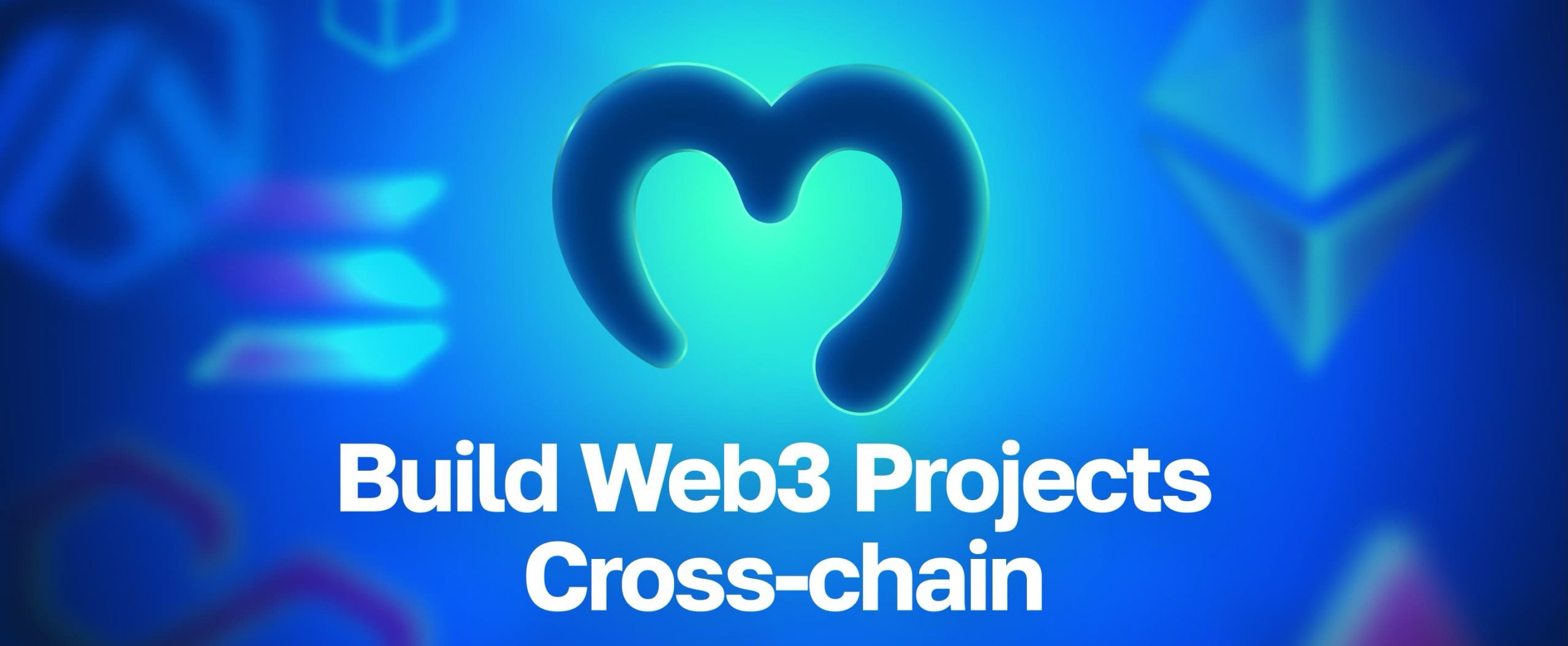
But why should you leverage Moralis when building Web3 dapps?
To answer the above question, let’s explore three benefits of Moralis:
- Comprehensive: Our API responses are designed to give you more data with fewer requests. As such, when using Moralis, you can enhance your developer experience by streamlining operations, reducing costs, and simultaneously improving performance.
- Cross-Chain: Our APIs are cross-chain compatible, supporting all the major chains, including Ethereum, BSC, Polygon, and many others. Consequently, when building with Moralis, you don’t have to bother with a new provider for each chain you interact with.
- Trusted: Moralis is trusted and used by 100,000+ developers and large enterprise customers like MetaMask, Delta, Blockchain.com, and many others:

To give you better insights into the benefits of Moralis, let’s now explore our Web3 API suite and introduce you to three of our most prominent APIs!
Moralis’ Web3 API Suite
- Wallet API: The Wallet API supports over 500 million addresses across all major chains, giving you seamless access to wallet data from networks like Ethereum, Polygon, BSC, Optimism, and many others!
With single API calls, you can get any wallet’s history, net worth, profitability, token balances, and much more. As such, with the Wallet API, you can effortlessly build everything from cryptocurrency wallets to portfolio trackers without breaking a sweat!
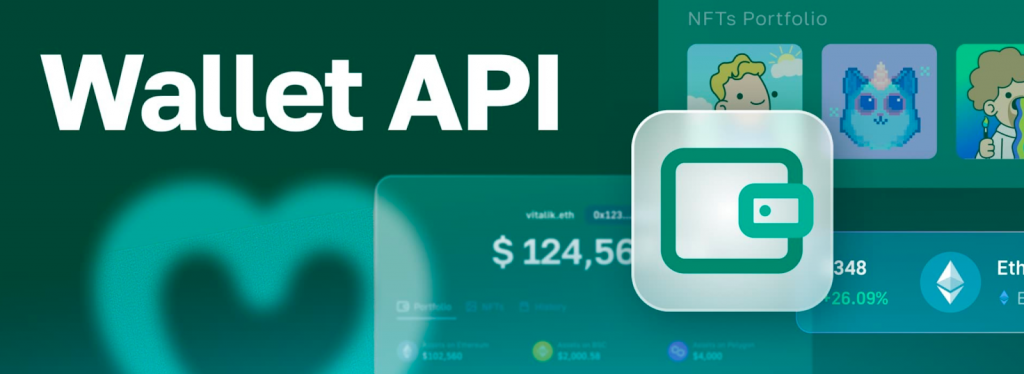
- Token API: The Token API supports all tokens across the biggest chains. This includes stablecoins like USDC, meme coins like Shiba Inu, and everything in between. As such, if you’re looking to build a dapp that needs ERC-20 data, check out Moralis’ Token API!
With the Token API, you can effortlessly get balances, prices, metadata, and much more with just one endpoint. Consequently, this is the ultimate tool if you’re building decentralized exchanges (DEXs), token explorers, or other similar platforms.
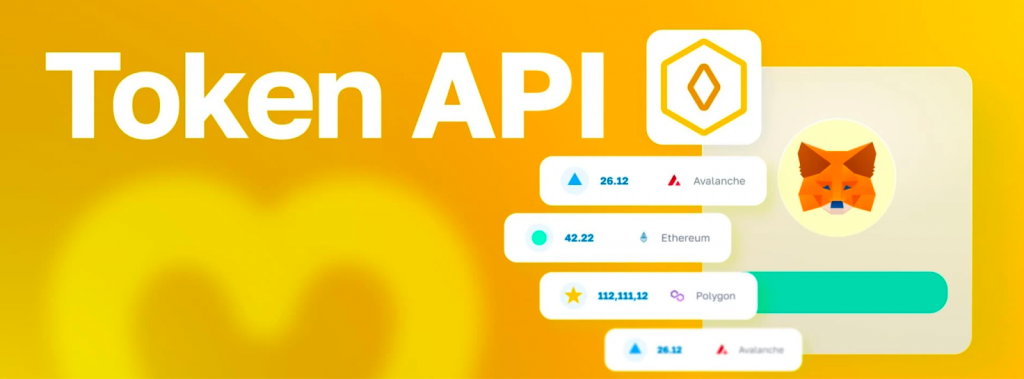
- NFT API: Moralis’ NFT API is the industry’s #1 tool for NFT data. This premier interface supports three+ million NFT collections, including everything from well-established projects like CryptoPunks to tokens that dropped just seconds ago!
With the NFT API, you just need single API calls to fetch balances, up-to-date metadata, prices, and more. So, when working with Moralis and the NFT API, you can effortlessly build everything from NFT marketplaces to exciting Web3 games.
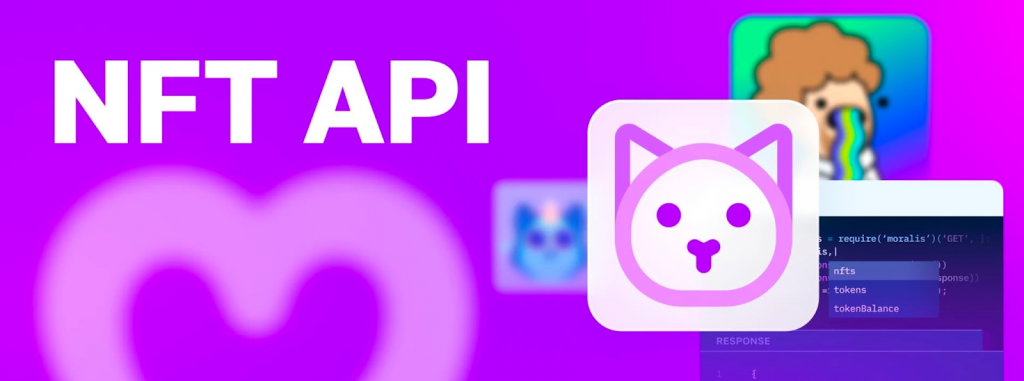
Visit our Web3 API page if you want to explore all our available interfaces!
Summary: Top Alchemy Pipelines Alternative
Alchemy Pipelines offers a user-friendly solution for creating Web3 data pipelines through an intuitive point-and-click interface. However, while it simplifies setup, Alchemy Pipelines has some notable limitations. Fortunately, there are many prominent alternatives available, and at the top of the list, you’ll find Moralis’ Streams API!
With the Streams API, it’s possible to set up cross-chain data pipelines for any custom event at the click of a button. As such, with this premier interface, you can now integrate in-app notifications, populate databases with real-time information, etc., without breaking a sweat.
But what makes Moralis’ Streams API the best alternative to Alchemy Pipelines?
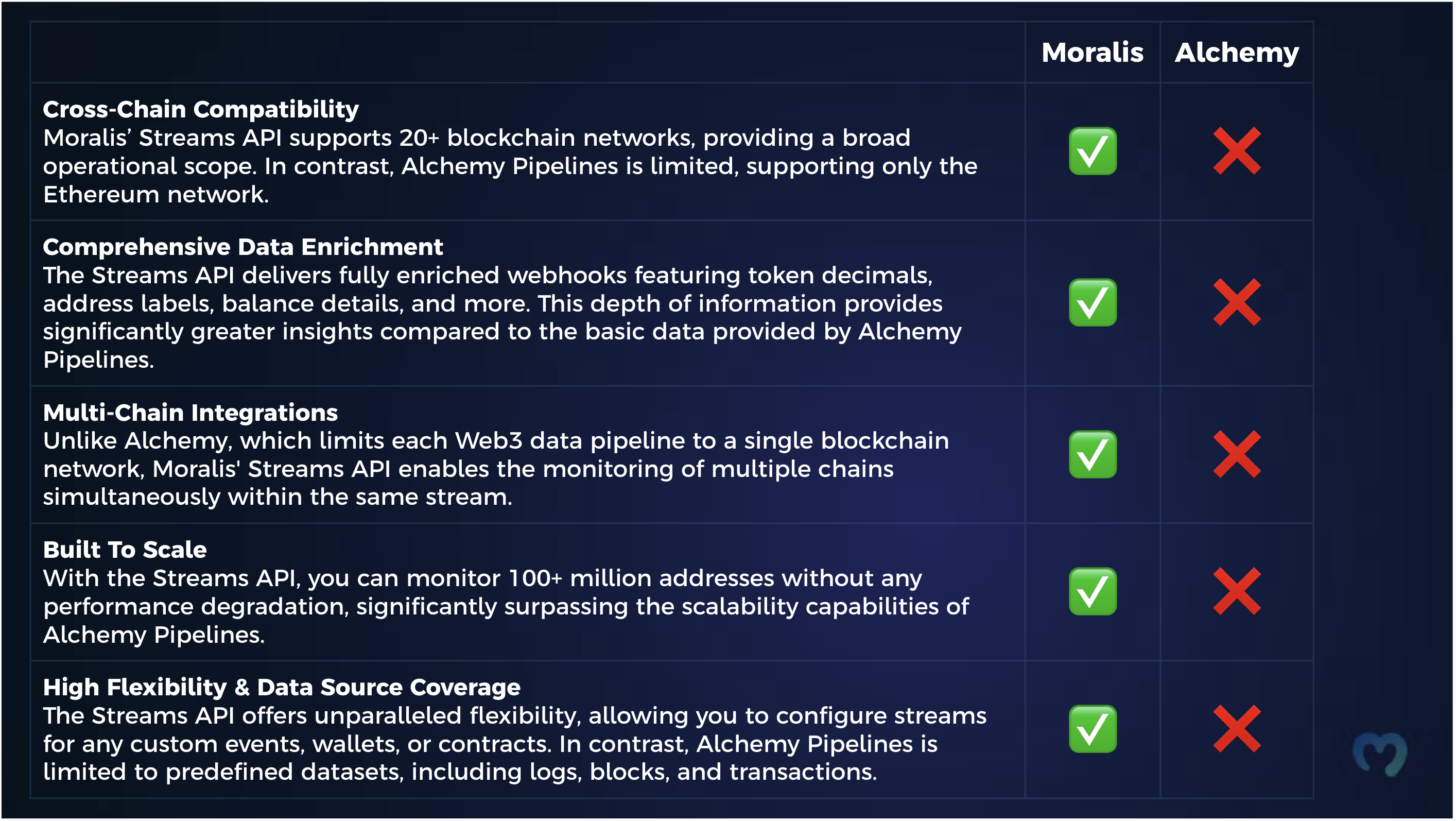
Alchemy Pipelines is a solid service, yet it has shortcomings, as seen in the image above.
If you liked this guide, consider checking out more Web3 content on our blog. For instance, read about our Wallet History API or learn how to build dapps on the Moonbeam network.
Also, if you want to set up your own pipelines with Moralis, don’t forget to sign up. You can create an account for free, and you’ll gain immediate access to our Streams API!



